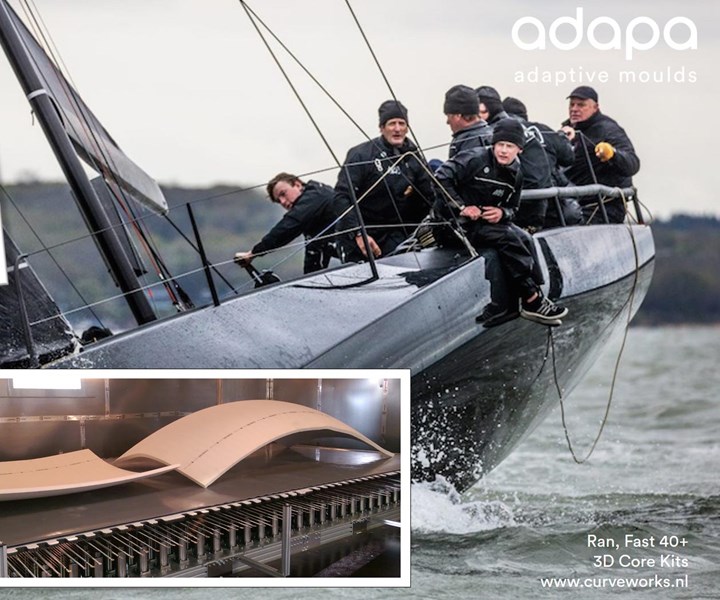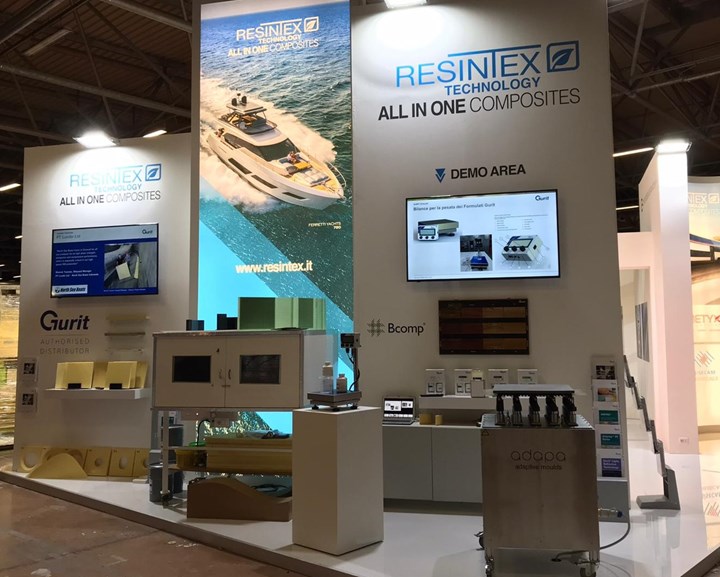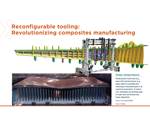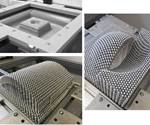Adapa reconfigurable molds enable weight saving in the marine industry
Gurit helps demonstrate resin saving and dynamic performance of thermoformed Corecell foam core.

Adapa adaptive molds are used by Curve Works to produce curved 3D core kits using Gurit Corecell foam core for lightweight racing sailboats such as the FAST 40+ design, exemplified by RAN, shown here, a carbon fiber racer in the U.K. designed by Carkeek Design Partners. SOURCE | Adapa
Gurit introduces in their April 2020 Marine Newsletter, that the marine industry can save weight when using their Corecell material for forming curved panels on an adaptive mold.
Adapa (Aalborg, Denmark) supplies adaptive, robotic molds for the manufacture of curved surfaces and has already used its technology to thermoform Gurit (Wattwil, Switzerland) Corecell foam in full-scale production of lightweight marine vessels.
Gurit engineers have worked with thermoforming expert Curve Works (Zoetermeer, Netherlands) to demonstrate the Adapa adaptive mold technology. As described in the April 2020 issue of Gurit’s Marine Newsletter, the team, using 30-millimeter-thick Corecell M100 thermoformed to a 1200-millimeter radius, found the material had a similar resin uptake to a flat plain sheet. This means a 73% resin saving is achieved in comparison to doing the same with single cut foam and 138% saving compared with contour scrim foam. Dynamic testing of the thermoformed core also confirmed that it was able to absorb the same level of dynamic energy as the virgin material. Based on these results, Gurit suggests thermoformed Corecell M foam is the process and material of choice for forward slamming areas that are typically curved.
This technology was demonstrated at the Compotec 2020 event held in February in Italy. There, Gurit’s distributor Resintex showcased how to thermoform curved Corecell in cooperation with Curve Works, using a demonstrator mold system contributed by Adapa. The team discussed that this approach provides not only lighter weight ship construction but also cost savings due to reduced resin usage and waste.

Resintex booth at COMPOTEC 2020 event in Italy, showing Adapa demonstrator mold at right. SOURCE | Gurit, Adapa
Learn more about Adapa and Curve Works in CW’s 2017 feature article on reconfigurable tooling.
Related Content
-
Natural fiber composites: Growing to fit sustainability needs
Led by global and industry-wide sustainability goals, commercial interest in flax and hemp fiber-reinforced composites grows into higher-performance, higher-volume applications.
-
Plant tour: Joby Aviation, Marina, Calif., U.S.
As the advanced air mobility market begins to take shape, market leader Joby Aviation works to industrialize composites manufacturing for its first-generation, composites-intensive, all-electric air taxi.
-
Plant tour: Teijin Carbon America Inc., Greenwood, S.C., U.S.
In 2018, Teijin broke ground on a facility that is reportedly the largest capacity carbon fiber line currently in existence. The line has been fully functional for nearly two years and has plenty of room for expansion.
















